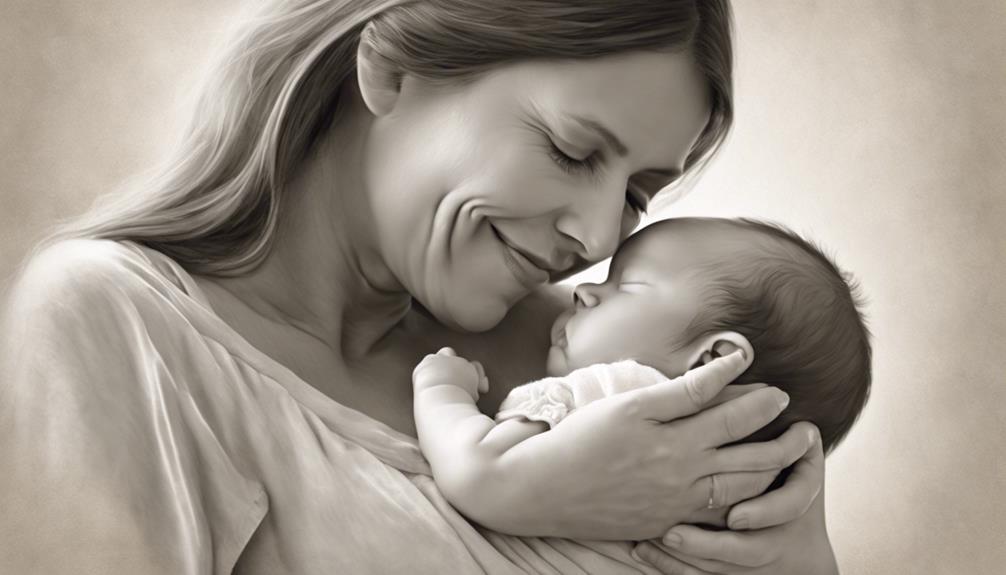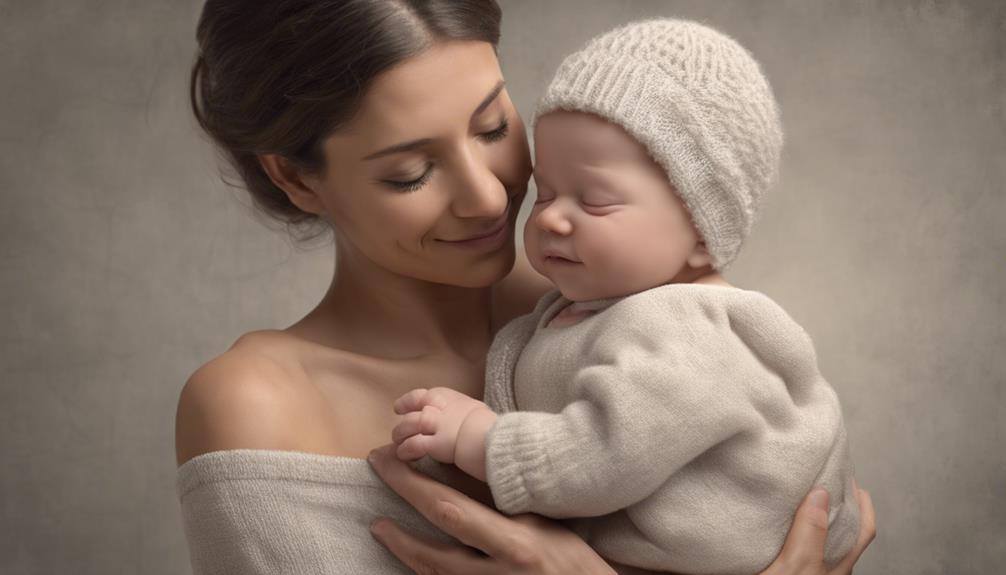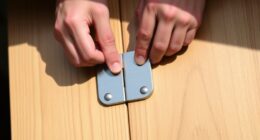When your newborn's hiccups strike after a feeding session, it can feel like steering through stormy seas in search of calm waters. But fear not, as there are proven methods to help ease these tiny tummy troubles.
From gentle burping techniques to the use of pacifiers, a few simple steps can make all the difference. So, let's explore together how you can bring relief to your little one and create a peaceful post-feeding routine.
Key Takeaways
- Swaddle snugly and offer a pacifier for comfort.
- Burp gently to release trapped air and prevent discomfort.
- Adjust feeding positions to reduce air intake and hiccups.
- Consider gripe water under pediatrician guidance for relief from hiccups.
Swaddle Your Baby
To help calm your newborn's hiccups after feeding, consider swaddling your baby snugly but comfortably to provide a sense of security and mimic the womb's comforting environment.
Swaddling can work wonders in soothing your little one by creating a cozy cocoon that helps them feel safe and relaxed.
The gentle pressure from the swaddle can mimic the snugness of the womb, which in turn calms your baby's nervous system, making those pesky hiccups less bothersome.
Offer a Pacifier
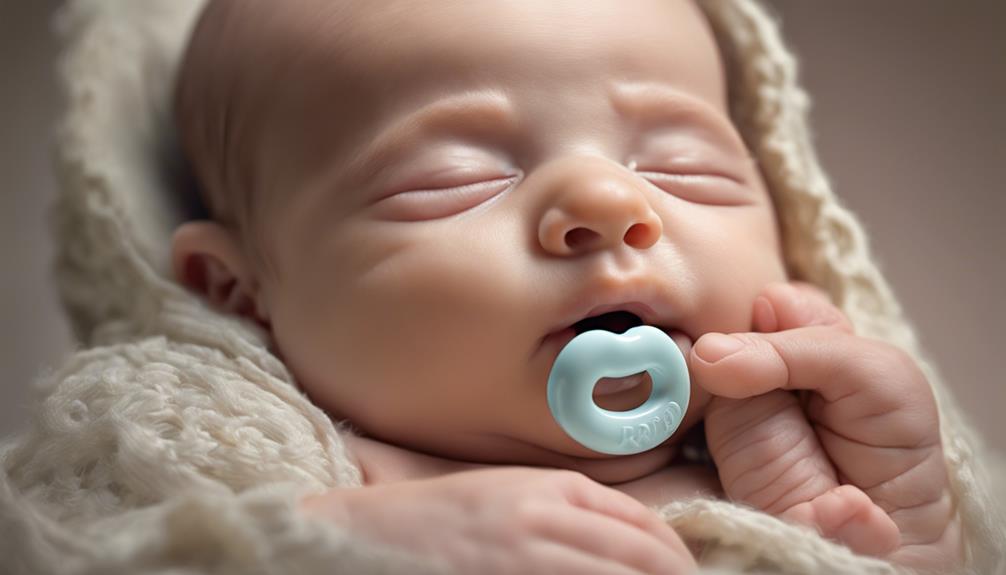
Consider offering your newborn a pacifier after feeding to help relax their diaphragm and reduce hiccups. Pacifiers aren't only safe but also recommended by healthcare providers for soothing hiccups in babies. Here are some reasons why offering a pacifier can be beneficial:
- Sucking on a pacifier can regulate breathing patterns and potentially stop hiccups in newborns.
- The sucking motion while using a pacifier may distract the baby from hiccups.
- Pacifiers provide comfort and may help alleviate hiccups by encouraging rhythmic sucking movements.
- Using a pacifier post-feeding can aid in soothing your little one.
- It's a simple and effective way to help your baby relax and reduce the occurrence of hiccups.
Burp Your Baby Gently

After offering your newborn a pacifier for soothing hiccups, the next step is to gently burp your baby to release trapped air and prevent further discomfort.
Burping your baby is vital as it helps in reducing the chances of hiccups by getting rid of air bubbles swallowed during feeding. To do this effectively, hold your baby against your chest in an upright position, supporting their chin and chest with your hand. Lightly pat or rub their back in an upward motion to encourage the release of any trapped air.
Remember to burp your baby multiple times during and after feeding to make sure they're comfortable and minimize the occurrence of hiccups. Ensuring a proper burping technique not only aids in preventing hiccups but also reduces the likelihood of spit-ups and fussiness.
Change Feeding Positions
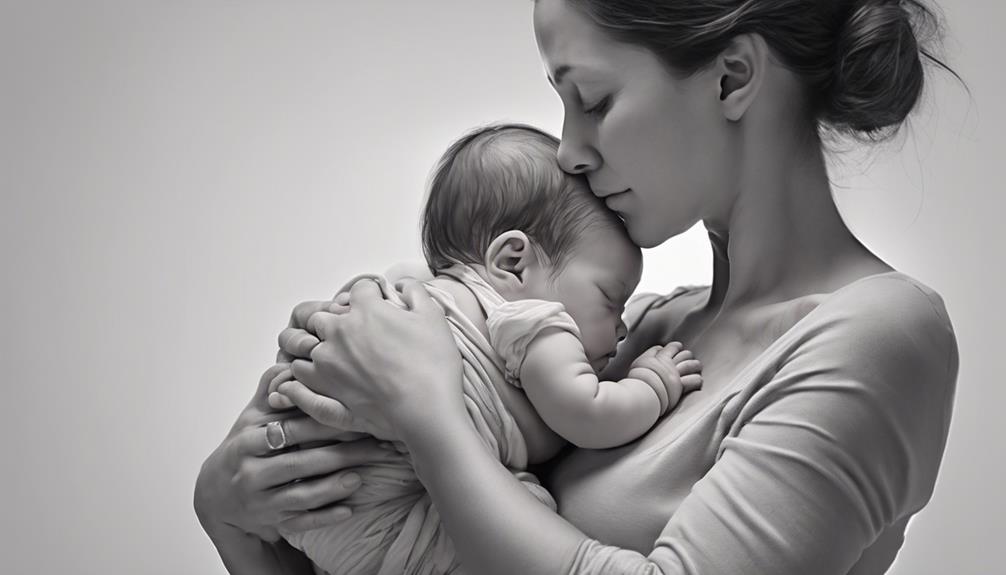
Adjust the feeding positions of your newborn to alleviate hiccups and promote smoother feedings. Changing how you position your baby during feedings can make a significant difference in reducing hiccups. Here are some practical tips to help you find the most comfortable and effective feeding position for your little one:
- Hold your baby upright or at a slight angle to prevent air swallowing and minimize hiccups.
- Adjust the angle of the bottle or breast to reduce air intake and promote smoother feedings.
- Experiment with different feeding positions like the football hold or cradle hold to see what works best for your baby.
- Keep your baby calm and relaxed during feedings to help reduce hiccups after feeding.
- Remember that finding the right feeding position is a process of trial and error, so be patient and attentive to your baby's cues.
Try Gripe Water
To address persistent hiccups in your newborn, considering trying gripe water under the guidance of your pediatrician, as it may offer relief with its natural ingredients like fennel and ginger. Gripe water is an over-the-counter remedy that contains herbs known for their calming properties, which can help soothe hiccups in infants. Before administering gripe water to your baby, it's important to consult with your pediatrician to confirm it is safe and suitable for your little one, especially if they are experiencing issues like gas or colic.
| Key Points | Details |
|---|---|
| Gripe Water Ingredients | Contains natural herbs such as fennel and ginger, known for their calming effects. |
| Pediatrician Consultation | Always consult with your pediatrician before giving gripe water to your newborn. |
| Relief from Common Issues | Gripe water is often used to alleviate symptoms like gas, colic, and, importantly, hiccups in infants. |
| Dosing Instructions | Follow dosing instructions carefully to guarantee your baby's safety and well-being. |
Frequently Asked Questions
How Do I Stop My Newborn From Hiccuping After Feeding?
To stop your newborn from hiccuping after feeding, try burping frequently, keeping your baby upright, offering a pacifier, feeding smaller amounts, and creating a calm environment. These simple steps can help ease hiccups.
How Do You Settle a Newborn's Hiccups?
To settle a newborn's hiccups, try burping, holding upright, offering a pacifier, avoiding overfeeding, and gentle belly rubs. These actions can help release trapped air, aid digestion, relax the diaphragm, and soothe your baby.
Is It OK to Lay Baby Down With Hiccups?
It's okay to lay your baby down with hiccups; it won't harm them. Hiccups are common, harmless, and usually resolve on their own. If your baby seems uncomfortable or hiccups persist, consult your pediatrician for guidance.
Should I Keep Feeding My Newborn if He Has Hiccups?
If your newborn has hiccups during feeding, it's generally safe to keep going. Pausing to burp briefly can help. A calm environment and letting baby finish eating are recommended. Trust your instincts.
Conclusion
If your newborn is experiencing hiccups after feeding, don't worry! Remember, hiccups are common and usually harmless.
Try swaddling, offering a pacifier, burping gently, changing feeding positions, or using gripe water to soothe your baby. Trust that these simple techniques can help relieve hiccups naturally.
Just like a gentle breeze calms the storm, these methods can bring peace to your little one's tummy troubles. So, take a deep breath and remember, you've got this!


